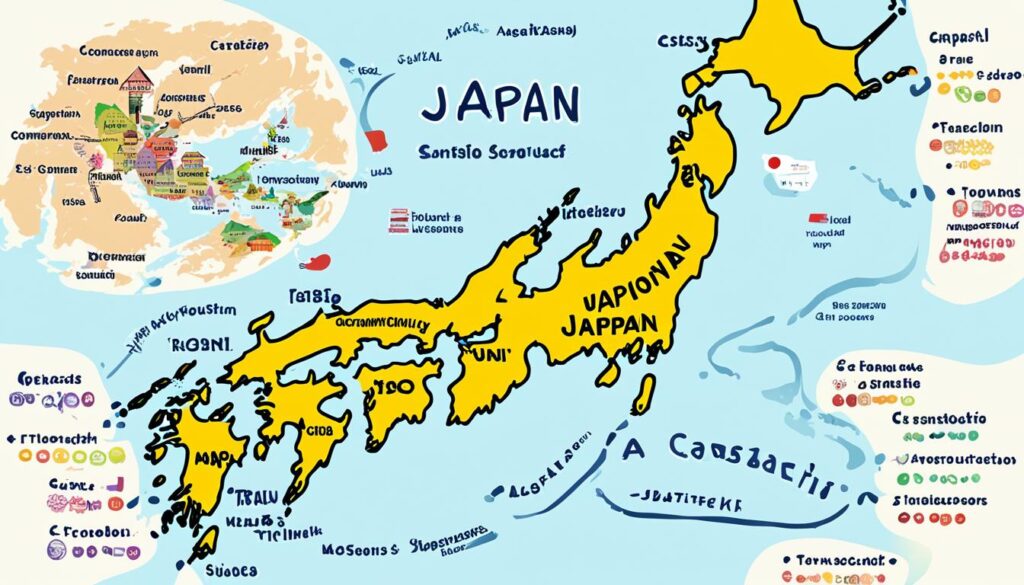Pronouncing English names correctly in Japanese can be a challenge, but with the right guide, you can navigate the intricacies of Japanese phonetics easily. Knowing how to pronounce a person’s name in their language can make a significant difference in making solid impressions, building connections, and creating a culture of diversity and inclusion. In this comprehensive guide, we will provide you with the tools to pronounce English names accurately in Japanese.
When learning how to say English names in Japanese, it’s important to understand the meaning and grammar behind the language. Japanese follows different rules compared to English when it comes to pronunciation. Each syllable in Japanese has equal length and strength, with no significant stress on specific syllables. Additionally, there are no diphthongs in Japanese, meaning that two consecutive vowel letters represent separate syllables. All Japanese syllables are open, ending with a vowel sound except for the “N” syllable. Double consonants form their own syllables in Japanese.
To pronounce English names in Japanese, it’s crucial to understand the pronunciation of the five basic vowel sounds in Japanese. The letter “a” represents a sound similar to the American “a” in “father,” while “e” represents a sound like the “e” in “pet.” The letter “i” is pronounced like the “ee” in “feet,” and “o” is similar to the initial position of the American “o” in “so.” The letter “u” is pronounced like the “oo” in “fool.”
Equivalent words can be used as a reference point when trying to pronounce English names in Japanese. By breaking down English names into their Japanese equivalents, it becomes easier to find the corresponding sounds in Japanese. Using resources such as NameShouts and Japanese Phonetic Converter can also assist in determining the correct pronunciation of English names in Japanese.
When writing English names in kanji, it’s important to consult with native speakers or experts in Japanese language and culture to ensure accuracy. Kanji representations of English names should be chosen carefully, considering the meanings and cultural connotations associated with the characters used.
Understanding the contextual and cultural usage of Japanese pronunciation plays a significant role when pronouncing English names. By accurately pronouncing someone’s name in their language, you show respect for their culture and identity. This promotes diversity and inclusion, leading to stronger connections, better relationships, and a more harmonious society.
Basic Principles of Japanese Pronunciation
The Japanese language follows different rules compared to English when it comes to pronunciation. Understanding some basic principles of Japanese pronunciation can help improve your accuracy.
One important rule is that each syllable in Japanese has equal length and strength, with no significant stress on specific syllables. This means that every syllable should be given the same amount of emphasis.
Additionally, unlike English, there are no diphthongs in Japanese. In Japanese, two consecutive vowel letters represent separate syllables. This is important to remember when pronouncing English names in Japanese.
Another key aspect is that all Japanese syllables are open and end with a vowel sound, except for the syllable “N”. So when you pronounce a Japanese word or name, make sure to give each syllable a clear and distinctive vowel sound.
Furthermore, it’s worth noting that double consonants in Japanese are treated as a separate syllable. For example, the name “Suzuki” is pronounced as “su-zu-ki” with three syllables, not two.
Understanding these basic principles of Japanese pronunciation will greatly enhance your ability to pronounce English names accurately in Japanese.
The Five Vowels of Japanese
Japanese has five basic vowel sounds, each represented by a single vowel letter in the Roman alphabet. The letter “a” represents a sound similar to the American “a” in “father,” while “e” represents a sound like the “e” in “pet.” The letter “i” is pronounced like the “ee” in “feet,” and “o” is similar to the initial position of the American “o” in “so.” The letter “u” is pronounced similarly to the “oo” in “fool.” Understanding the pronunciation of these basic vowel sounds will form the foundation for accurately pronouncing English names in Japanese.
Open Syllables and the Special Syllable “N”
In Japanese, all syllables are open, meaning they end with a vowel sound. This makes syllable division relatively straightforward. However, there are two exceptions to this rule. The first exception is the syllable “N,” which can form a syllable by itself in certain circumstances. For example, the word “kanji” is divided into three syllables: ka-N-ji. The second exception is double consonants, which form their own syllables in Japanese. It’s important to be aware of these exceptions when dividing English names into syllables for proper pronunciation in Japanese.
Clapping Technique for Syllable Length and Strength
A useful technique for practicing Japanese pronunciation is the clapping method. To ensure equal length and strength of syllables, clap your hands while saying Japanese words. For example, for the word “yokozuna,” which has four syllables (yo-ko-zu-na), clap your hands four times with equal intervals between each clap. Say the syllables evenly and with the same strength as you clap. This technique helps train your mouth and ears to create a consistent rhythm in your Japanese pronunciation.
To practice the clapping technique, follow these steps:
- Choose a Japanese word or phrase that you want to practice pronouncing.
- Break down the word or phrase into individual syllables.
- Clap your hands in a steady rhythm, with each clap representing one syllable.
- Say the syllables out loud while clapping, making sure to match the rhythm and strength of your claps.
By using the clapping technique, you can improve your understanding of syllable length and strength in Japanese pronunciation. This method trains your ears to recognize the rhythm and helps develop muscle memory in your mouth for producing accurate and consistent syllables.
Practicing pronunciation is essential for mastering Japanese. The clapping technique is just one of many techniques you can use to improve your pronunciation skills. Incorporating this technique into your language learning routine can make a significant difference in your ability to pronounce Japanese words accurately.
Common Japanese Family Names Pronunciation Guide

To assist you in pronouncing common Japanese family names correctly, we have compiled a pronunciation guide based on the 100 most common Japanese family names provided by the Japan Times. These names include Sato, Suzuki, Takahashi, Tanaka, and many more. It’s important to note that the pronunciation of each name will follow the principles of Japanese phonetics discussed earlier in this guide. Familiarizing yourself with the correct pronunciation of these common family names will help you communicate effectively and respectfully in a Japanese context.
| Family Name | Pronunciation |
|---|---|
| Sato | Sah-toh |
| Suzuki | Soo-zoo-kee |
| Takahashi | Tah-kah-hah-shee |
| Tanaka | Tah-nah-kah |
Resources for Learning Japanese Name Pronunciation
There are several resources available to help you learn Japanese name pronunciation. One notable resource is NameShouts, a service that provides pronunciations of names in various languages, including Japanese. They offer a wide range of Japanese family names ready for you to learn and practice. Additionally, the Japanese Phonetic Converter website allows you to input any Japanese text and hear its standard pronunciation. These tools can greatly enhance your understanding and proficiency in pronouncing English names in Japanese.
For a more visual representation, check out the following table showcasing the features of NameShouts and the Japanese Phonetic Converter:
| NameShouts | Japanese Phonetic Converter |
|---|---|
| Provides pronunciations of names in various languages, including Japanese. | Allows you to input any Japanese text and hear its standard pronunciation. |
| Offers a wide range of Japanese family names for learning and practice. | Enhances your understanding and proficiency in pronouncing English names in Japanese. |
With these resources at your disposal, you can confidently navigate the intricacies of Japanese name pronunciation and ensure accurate and respectful communication.
Embracing Diversity and Inclusion Through Accurate Pronunciation
Mastering the art of pronouncing English names in Japanese is not just about accurate pronunciation; it is also about embracing diversity and fostering inclusion. When you make an effort to pronounce someone’s name correctly in their language, you show respect for their culture and identity.
Accurate pronunciation is an essential aspect of cultural respect. By pronouncing names accurately, you create a welcoming environment that values and appreciates diversity. It demonstrates your commitment to inclusivity and sends a powerful message that you acknowledge and honor the unique backgrounds and experiences of others.
Building connections through name pronunciation is a profound way to establish meaningful relationships. When you take the time and effort to pronounce someone’s name correctly, it shows that you value them as an individual. It fosters a sense of belonging and acceptance, creating a strong foundation for genuine connections and mutual understanding.
By prioritizing diversity and inclusion, we contribute to a more respectful and harmonious society. Accurate name pronunciation not only reflects cultural respect, but it also breaks down barriers and promotes unity. Together, we can create a world where everyone feels seen, heard, and celebrated.

